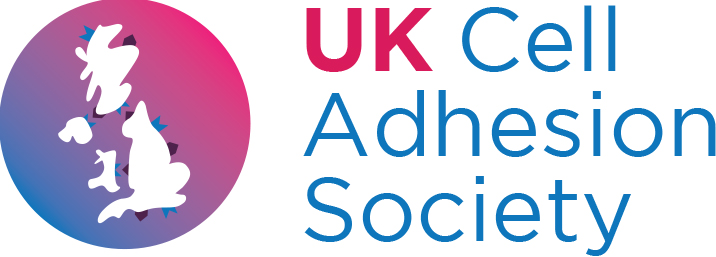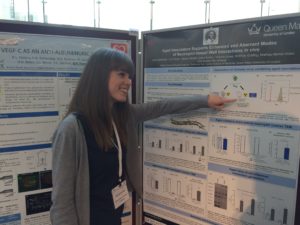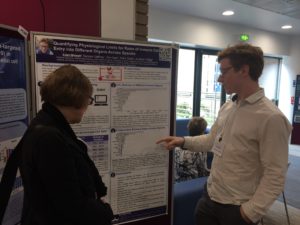Presentation Award Winners
Congratulations to Anna Barkaway (William Harvey Research Institute, QMUL, London) and Liam Brown (Wolfson Centre For Mathematical Biology, University of Oxford) for winning Best Poster presentations!
Congratulation to Chris Hansell (Glasgow), for winning Best Short talk!
Travel Awards for BMS/UKCAS meeting
For the first time in UKCAS meetings history, we are now giving Travel Awards to junior researchers to attend our yearly meetings.
Travel Awards of £100 towards the costs of attending the Joint BMS-UKCAS meeting on ‘The Many Facets of Inflammation’ were given to the following UKCAS members:
Camilla Cerutti
Randall Division of Cell and Molecular Biophysics, King’s College London, London, UK.
ROLES OF Cdc42 TARGETS IN REGULATING CANCER CELL : ENDOTHELIAL CELL INTERACTION
“First of all, I would like to thank the UK Cell Adhesion Society (UKCAS) for the travel grant award, that gave me the opportunity to attend the first joint meeting of the UK Cell Adhesion Society (UKCAS) and annual conference of the British Microcirculation Society (BMS). I found that the two societies put together a very good programme, with excellent speakers, leaders in the field and from prestigious universities. Furthermore, combining it with the BMS conference was very useful to widen up the field with very interesting talks that otherwise I would not come across.
I really enjoyed the Joseph Skitzi, Paul Kubes (picture), Yvonne Alexander and Britta Engelhardt (picture) keynote talks. Actually, this conference gave me the opportunity to personally attend Prof Skitzi and Kubes talk presenting their innovative and very elegant studies for the first time. Furthermore, there were very good quality talks from PhD and Post-doc selected for the short talks, and there were an impressive number of interesting posters. I really appreciated that the posters were on during all the duration of the conference, so I could discuss with many of the presenters, which was very useful, and maybe, this lead to a possible collaboration in the near future! During breaks and before the conference starting time I could chat with the numerous sponsors that had a stand in the conference hall like bio legend, star lab, Lonza and Thermofisher about their new products, that is always informative and convenient.
All in all, this was certainly a very good and well organized national conference with a wide range of related distinct topics in a very convenient location. I am looking forward to next meeting with new exciting findings!”
Izajur Rahman
Cardiovascular Division, King’s College London, London, UK.
HUMAN LEUKOCYTE PECAM-1 AND L-SELECTIN CO-CLUSTER IN CIS TO REGULATE TRANSENDOTHELIAL MIGRATION UNDER FLOW CONDITIONS
“I found the joint BMS/UKCAS meeting to be a fantastic opportunity to network with people that are at different stages of their career and also, active in different areas of research. I thought that the dinner was perfectly organised to allow greater interaction between attendees, in addition to the very enlightening poster sessions. Venues for both the meeting and the dinner were terrific. My highlights included the stunning array of imaging that was presented; the excellent talks provided by each keynote speaker, particularly Paul Kubes; and delivering an oral presentation about my own research. Despite the nerves leading up to the talk, presenting my work at this meeting was an enjoyable and valuable experience where I received some extremely useful feedback. Being selected for a UKCAS travel award was also a great surprise! Overall, I thought that the meeting was very interesting – I would certainly attend in the future! A definite recommendation for all PhD students!”
Hannah Law
William Harvey Research Institute, Queen Mary, University of London, London, UK.
GALECTIN-1 KO MICE EXHIBIT REDUCED DISEASE IN A NEUTROPHIL-DRIVEN MODEL OF ARTHRITIS
Bonita Apta
Department of Pharmacology, University of Cambridge, Cambridge, UK.
CHARACTERISATION OF HUVEC EXPOSED TO PROLONGED SHEAR STRESS.
“The UK Cell Adhesion Society’s 29th meeting was held across two days as a joint meeting with the British Microcirculation Society. This proved to be a fantastic idea, with many overlapping interests shared by both Societies. I was lucky enough to receive a Travel Award from the UK Cell Adhesion Society, which facilitated my attendance to the meeting allowing me to communicate my data by poster presentation.
Over the course of the meeting, we heard research presented by first class speakers from as far as Canada, including exciting new insights into monocyte and neutrophil activities following sterile injury from Professor Paul Kubes. There was ample opportunity to discuss research with other scientists at poster sessions, and to speak with a range of trade exhibitors about their products. A nice addition to the usual UKCAS meeting was the Conference Dinner, held in the grand grade II listed Birmingham Council House. Again, this provided an excellent opportunity to discuss research in a less formal manner (and generally have a good time!).
In summary, the UKCAS meetings are perfect for researchers of all career stages, inspiring different ways of thinking, new ideas, and collaborations. This year’s meeting left me enthusiastic to continue with my own research, and I sincerely look forward to what the next meeting holds for us all.”
Jessica Davies
Department of Pharmacology, University of Cambridge, Cambridge, UK.
EXPLORING PRO-INFLAMMATORY HMGB-1 RELEASE FROM PLATELETS
Ross King
Centre for Microvascular Research, William Harvey Research Institute, Barts and The London School of Medicine and Dentistry, Queen Mary, University of London, London, UK.
INVESTIGATING THE ROLE OF NEUTROPHIL-DERIVED TNF IN PATHOPHYSIOLOGICAL MICROVASCULAR HYPERPERMEABILITY
“I am very grateful to the UK Cell Adhesion Society for funding my trip to the first UKCAS/British Microcirculation Society joint meeting to present my work as an oral communication. I have been to BMS Meetings before as a student member and it was great to come to this meeting, this time instead as a member of UKCAS! The organisers from each Society should be very proud of this very harmonious and productive collaboration.
Whilst there were many impressive and inspiring plenary lectures given by senior academics, I was really impressed by the amount of time dedicated to giving younger researchers opportunities to talk about their work, which is something I think that is lacking at other scientific meetings. Through this, I was able to gain a lot of valuable feedback that I can use to further enhance my research.
Science aside, we had a great evening at the conference dinner, which was held in the very beautiful Birmingham Council house. This was a good opportunity to catch up with friends, and to make new connections that I look forward to enhancing further at the next UKCAS meeting!”
Anna Barkaway
William Harvey Research Institute, Barts & The London School of Medicine and Dentistry, Queen Mary University of London, Charterhouse Square, London, UK.
AGED VASCULATURE SUPPORTS ENHANCED AND ABERRANT NEUTROPHIL-VESSEL WALL INTERACTIONS IN VIVO
“Thank you very much to the UKCAS committee for selecting me to receive a travel grant to attend the 2017 conference. This conference was the first time I have presented my work nationally, and it was great to discuss with other students and academics alike. Hearing their suggestions and opinions was informative and helpful, and I was very pleased to win one of the poster prizes!
I’m very lucky to be part of a lab which is internationally recognised for intravital imaging; a technique I have learnt as part of my PhD. Therefore, hearing talks from academics such as Paul Kubes, who also conducts similar techniques in other inflammatory scenarios and tissues was a particular highlight for me. Not only was it great to hear from leading academics, but also junior scientists with an array of interesting data and beautiful images shown!
I also very much enjoyed the conference dinner which took place at Birmingham Council house; a very grand venue. After a great three course meal, scientific conversations continued late into the night, whilst a few braved the dance floor!
Overall, I really enjoyed the conference and learnt a lot. I look forward to UKCAS meetings in the future!”
Liam Brown
Wolfson Centre For Mathematical Biology, Mathematical Institute, University of Oxford, Oxford, UK.
QUANTIFYING IMMUNOTHERAPEUTIC POTENTIAL WITH ANATOMIC BLOOD FLOWS
“My stay in Birmingham for the annual UKCAS-BMS conference began with missing my (mercifully local) stop on the train and walking back along the canal alongside the tracks, dodging angry geese as I went. The canal impressed upon me that the city was unexpectedly beautiful, a theme that continued as I found that the university was beneath the striking clock-tower I had been seeing on the skyline, to the medical school, whose modern elegance was matched only by central station and the high street. At the end of the first day, it was all topped by the conference dinner at the magnificent council house. Top marks for the choice of venue by the organisers.
As for the meeting itself, I came as a mathematician armed with a relatively meagre knowledge of medicine. I braced myself for the greatest of scepticism from my fellow attendees, but I was surprised to find that visitors to my poster were interested and I had more than a few insightful conversations. I was also able to have stimulating conversations over other posters, with a few of the oral presenters and even at the conference dinner, where I chatted to some very friendly people from Birmingham and Glasgow.
I felt that the poster sessions, though interesting, had capacity to be improved. Most poster attendees were obligated to stay by their own posters for much of the time, which limited their ability to talk to other poster presenters. Secondly, a strategy to ‘force’ people to mix with other posters would be useful, for example by combining the poster session with a drinks reception to loosen tongues, or by ‘speed-meeting’ others beforehand, which I’ve seen work successfully at small conferences.
The worst moment of the meeting fortunately cannot be attributed to the science. My adventures at the canal did not end with my train-stop-missing, as a journey back to the university on Tuesday morning was punctuated by a bonded pair of geese blocking the way. These geese had progressed from their default state of “angry” to their second and final state, “absolutely livid”, and were having none of my attempts to pass. I at least managed to work off the conference’s buffet lunches as I ran away.
I would like to take this opportunity to thank the UKCAS and BMS for holding the conference, and in particular the UKCAS for kindly awarding me not just a travel grant but a poster prize too. Finally, I would also like to thank all the other presenters for sharing their exciting work, and the people who gave me their opinions and advice on my own work. I hope to see all involved again in the future!”
Markella Alatsatianos
Institute of Infection and Immunity, School of Medicine, Cardiff University, Cardiff, UK.
TUMOURICIDAL T LYMPHOCYTE HOMING IN A MURINE CANCER MODEL USING MICRO-PET/CT
“The meeting between the UK Cell Adhesion Society (UKCAS) and the British Microcirculation Society (BMS) was the first joint meeting to be held between the two societies. It was organised over two days with an evening dinner for an opportunity to network. The meeting was a good platform for different groups to exhibit their work through both poster and oral presentations. These works covered a wide range of areas of immunology from in vitro based experiments to in vivo models.
All talks and posters were very interesting and well presented. I found the range of oral presenters, from PhD and medical students to postdoctoral scientists, academics and surgeons, good for creating a more translational and collaborative environment.
One of the most enjoyable talks from this meeting, for me, was that of Dr. Joseph Skitzi on a new approach to use intravital microscopy to image real-time blood vessels at a cellular level in vivo. I was able to relate his findings to the work I am currently involved in myself.
The posters were of equal standing. I was pleasantly surprised with how many posters were presented. I had displayed my own poster at this meeting, which allowed others with similar interest to approach and share ideas. The time for the poster sessions in between talks allowed us to explore and discuss the other projects in an informal setting.
I was glad of the opportunity to attend the joint UKCAS-BMS meeting this year. It seems to have been a success and I hope the two societies will be holding similar meetings again in the future.”
Helen Owens
Division of Psychological Medicine and Clinical Neurosciences, Cardiff University, Cardiff, UK.
THE ROLE OF EphA1 IN BLOOD-BRAIN BARRIER PERMEABILITY TO NEUROTOXIC LEUCOCYTE


